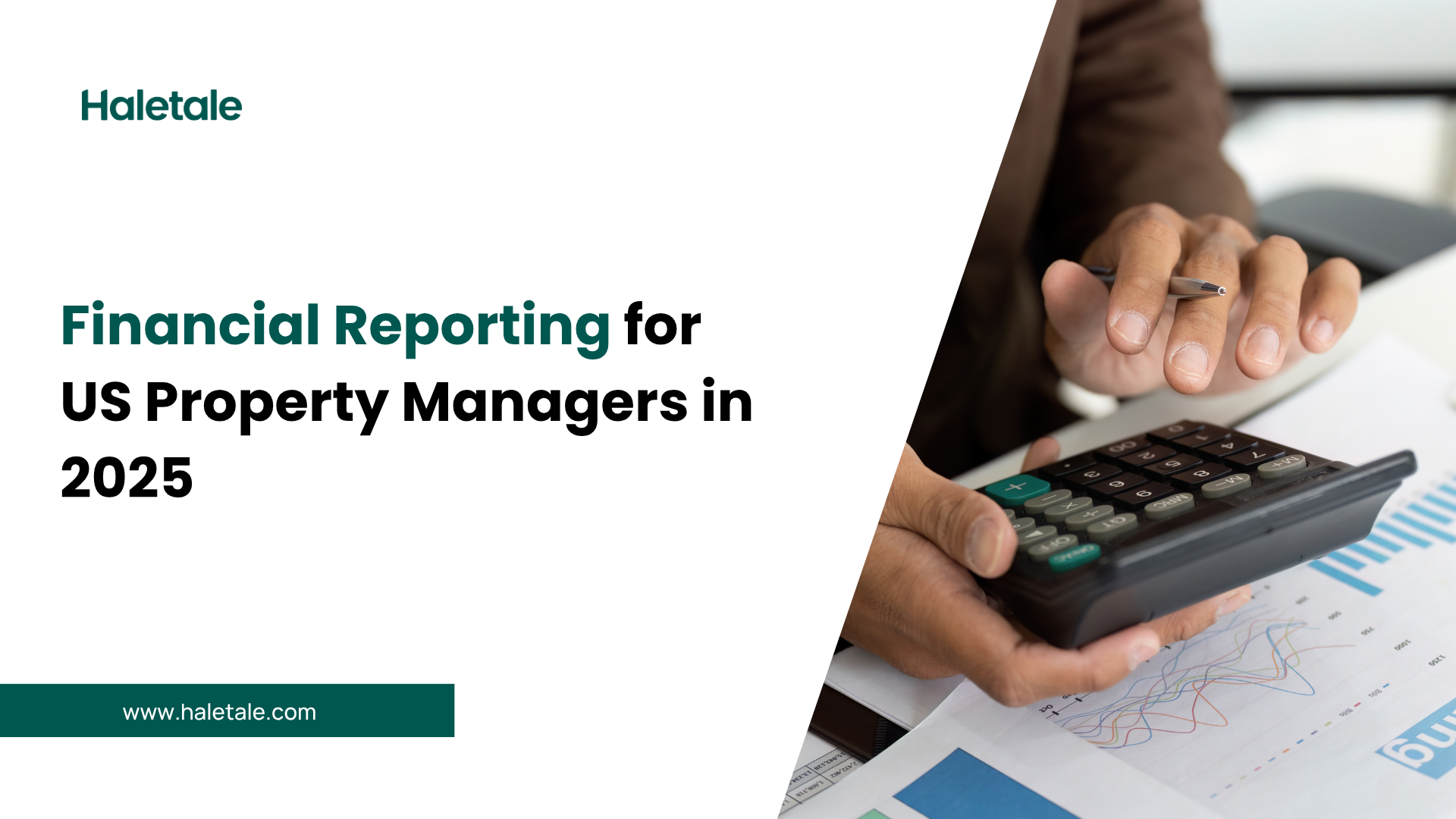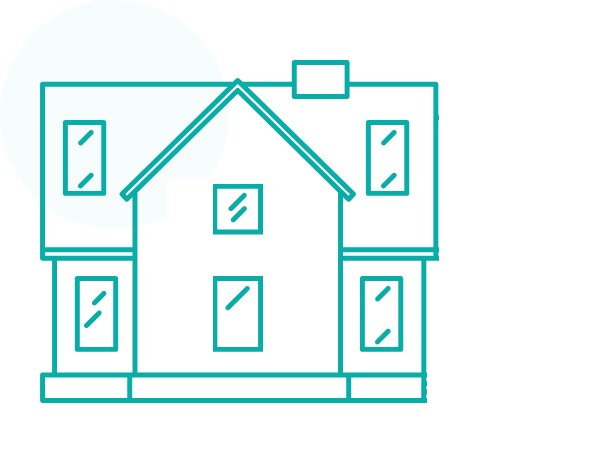Financial Reporting for Property Managers: Tax Season Made Simple
Most landlords spend $1,500-4,500 each year paying accountants to organize messy receipts and categorize expenses. Haletale cuts that cost by 80% by automating expense tracking, generating profit & loss statements and balance sheets, creating 1099 forms automatically, and organizing everything by property and contact.
The result? Your accountant spends 2-3 hours on actual tax prep instead of 10-15 hours sorting paperwork. That’s $3,000+ back in your pocket, plus every deduction captured and full IRS compliance without needing accounting expertise.
How Property Management Software Saves $3,000 in Accountant Fees
Tax season. Just reading those two words probably sent a shiver down your spine if you’re a landlord or a property manager. The pile of receipts scattered across your desk, the spreadsheets that never quite balance, the nagging worry that you’re missing crucial deductions—it’s enough to make anyone want to bury their head in the sand.
But here’s the truth: in 2025, managing your rental property finances doesn’t have to feel like trying to solve a Rubik’s cube blindfolded. With the right tools and systems in place, you can transform tax season from a months-long nightmare into a smooth, streamlined process that actually saves you money.
The Hidden Cost of DIY Accounting
Before we dive into solutions, let’s talk about what inadequate financial tracking is really costing you. According to real estate tax experts, spreadsheets become unmanageable as portfolios grow, and even a misplaced decimal can wreak havoc on end-of-year profit and loss statements. More importantly, disorganized records often lead to missed deductions—potentially thousands of dollars left on the table each year.
Consider this: property manager expenses ranging from marketing to legal fees and maintenance costs can add up quickly and amount to thousands of dollars annually. Without proper tracking, you’re likely missing some of these deductions. And when tax time rolls around, most property managers face a choice: spend countless hours trying to reconstruct their financial year, or pay an accountant premium rates to sort through the chaos.
The 2025 Tax Landscape: What’s Changed
This year brings significant updates that make organized financial reporting more critical than ever. The IRS has implemented phased thresholds for 1099-K reporting: $5,000 for 2024, reducing to $2,500 for 2025, and dropping to just $600 from 2026 onward. This dramatic decrease from the previous $20,000 threshold means more landlords than ever need to stay on top of their reporting obligations.
Additionally, landlords must file Form 1099-NEC for any independent contractor paid $600 or more during the year through cash, check, or direct deposit. This includes your property managers, maintenance workers, landscapers, and cleaning services. Property managers must also file Form 1099-MISC to report rent paid in excess of $600 during the tax year, and the same for contractors not taxed as corporations.
The stakes are high: failing to file required 1099 forms can result in IRS penalties ranging from $50 to $310 per form, depending on how quickly you correct the error. And that’s just the beginning of potential problems with the IRS.
The Expense Categorization Challenge
One of the biggest headaches for property managers is properly categorizing expenses. The IRS distinguishes between current expenses (immediately deductible) and capital expenses (depreciated over time), and getting this wrong can trigger an audit.
Here’s what you can deduct right away:
- Mortgage interest – Often your largest deduction
- Property taxes – Fully deductible at city, county, and state levels
- Insurance premiums – Property, liability, and flood insurance
- Repairs and maintenance – Fixing broken items to maintain original condition
- Utilities – When paid by the landlord
- Property management fees – Professional services
- Legal and professional fees – Attorneys, accountants, and consultants
- Advertising costs – Marketing your rental property
- Travel expenses – For 2025, the standard mileage rate is $0.70 per mile for business travel
- Cleaning and maintenance services
But here’s where it gets tricky: repairs are deductible immediately, whereas capital improvements must be capitalized and depreciated over time, and mixing up these classifications is a typical audit trigger for the IRS. Fixing a leaky faucet? That’s a repair. Renovating an entire bathroom? That’s an improvement requiring depreciation over 27.5 years.
Without proper categorization from the start, you’re setting yourself up for either overpaid taxes (by not claiming legitimate deductions) or an IRS audit (by claiming expenses incorrectly).
The Power of Automated Financial Reporting
This is where modern property management software transforms the game entirely. Instead of drowning in receipts and manual data entry, imagine a system where:
Expense tracking happens automatically. Every payment you make gets categorized correctly from the start—sorted by property, by building, by vendor. No more guessing whether that $500 charge was a repair or an improvement six months after the fact.
Income tracking is effortless. Rent payments, late fees, pet deposits, parking fees—everything flows into your system automatically, properly categorized and ready for reporting.
Reports generate themselves. Need a profit and loss statement? A balance sheet? A Schedule E report for your taxes? Click a button and it’s done, whether you need monthly, quarterly, or annual views.
1099 generation is built-in. The system tracks which contractors and vendors need 1099 forms and generates them automatically when tax season arrives. No more scrambling to remember who you paid what throughout the year.
How Haletale Simplifies Property Accounting
With Haletale’s financial reporting system, you get sophisticated accounting without needing accounting expertise. Here’s how it works:
Smart Categorization by Property and Contact
Instead of one giant financial bucket, Haletale lets you organize everything by:
- Individual properties – Track performance of each rental unit separately
- Buildings – See the big picture for entire apartment complexes
- Contacts – Manage homeowner and landlord information alongside financial data
This granular organization means you always know exactly which property is performing well and which needs attention. When tax time comes, you can pull reports for specific properties or view your entire portfolio at once.
Professional Reports Without the Professional Price Tag
Property management accounting software can automate and simplify financial processes, reducing errors and keeping books up-to-date. Haletale takes this further by offering:
Profit & Loss Statements showing your rental income minus expenses for any time period you choose. These reports break down exactly where your money is coming from and where it’s going, helping you spot opportunities to increase profitability.
Balance Sheets giving you a snapshot of your financial position—assets, liabilities, and equity—essential for securing financing or evaluating your investment performance.
Custom Time Frames allowing you to generate monthly reports for routine monitoring, quarterly reports for investor updates, or annual reports for tax preparation.
The beauty of automated reporting is consistency. Every report follows the same format, uses the same categorization rules, and maintains the same level of detail. This consistency is exactly what accountants love to see and what the IRS expects during an audit.
The Real Value: Time and Money Saved
Let’s do some real math on what this saves you. A typical accountant charges between $150-300 per hour. If they’re spending 10-15 hours sorting through your disorganized receipts, categorizing expenses, and preparing your tax documents, you’re looking at $1,500-4,500 in fees just for basic organization and preparation.
Now imagine handing your accountant or tax preparer a complete, organized package:
- All income properly documented and categorized
- All expenses tracked with digital receipts attached
- Profit and loss statements for each property
- 1099 forms already generated
- Depreciation schedules maintained
- Schedule E ready for final review
Your accountant’s job becomes verification and optimization rather than reconstruction and organization. This can reduce their time to 2-3 hours of actual tax preparation work, saving you thousands in professional fees while ensuring nothing gets missed.
Common Accounting Mistakes That Cost Property Managers
Even experienced property managers make costly mistakes when managing their finances manually. Here are the most common pitfalls:
Missing Deductions
Allowing receipts to pile up and leaving accounting until the end of the year is a sure-fire way to make mistakes and miss deductions, leading to overpaid taxes. Small expenses add up: that $30 hardware store run, the $50 cleaning supply purchase, the $100 locksmith visit. Miss enough of these throughout the year and you’ve left hundreds or thousands in deductions unclaimed.
Inconsistent Record-Keeping
Even something as simple as a misplaced decimal can wreak havoc on your end-of-year profit and loss. Manual entry errors compound over time, making your financial reports unreliable for decision-making and suspicious to the IRS.
Mixing Personal and Business Expenses
Without a dedicated system for rental property finances, it’s easy to accidentally categorize personal expenses as business expenses or vice versa. This not only complicates your taxes but claiming personal expenses as deductions is risky and can trigger an audit.
Late or Missing 1099 Forms
Form 1099-NEC must be mailed to recipients and filed with the IRS by January 31. Missing this deadline results in automatic penalties, and forgetting to file 1099s entirely can lead to much steeper fines plus interest.
Incorrect Income Reporting
One of the most frequent causes of audits is discrepancies between reported income and information submitted to the IRS, such as mismatched 1099s. The IRS uses automated systems to catch these inconsistencies, making this an easy way to trigger unwanted attention.
The Audit-Proof Advantage
Nobody wants to face an IRS audit, but being prepared for one provides peace of mind and protects your financial interests. Having comprehensive records can help substantiate reported figures in case of an audit, reducing the risk of additional taxes or penalties.
With organized, automated financial reporting, you have:
- Digital receipts attached to every expense
- Transaction histories showing when and how payments were made
- Categorization logic explaining why expenses were classified certain ways
- Consistent reporting demonstrating systematic record-keeping
- Audit trails showing who made changes and when
This level of documentation transforms an audit from a nightmare scenario into a manageable inconvenience. You’re not scrambling to reconstruct your year—you’re simply sharing the organized records you’ve maintained all along.
Tax Season Strategy: Starting Strong
The best time to prepare for tax season is right now, not in March when deadlines are looming. Here’s your action plan:
Set up your system today. Whether you’re starting your first rental property or managing a growing portfolio, establish your financial tracking system immediately. Input your current properties, set up your vendor contacts, and begin categorizing every transaction.
Track everything in real-time. Make it a habit to enter expenses when they occur, not weeks or months later. Take a photo of that receipt right after the purchase. Log that contractor payment immediately after writing the check.
Review monthly reports. Don’t wait until year-end to look at your financial performance. Monthly reviews help you spot issues early, adjust your strategy, and make better decisions about rent rates, expenses, and property improvements.
Maintain supporting documentation. Digital copies of leases, contractor agreements, receipts, and correspondence should be stored in your system, making them instantly accessible when needed.
Consult with professionals strategically. When your books are organized and your reports are accurate, you can afford to meet with tax professionals during their less busy seasons (third and fourth quarter) when they have more time and attention to devote to strategic planning rather than crisis management.
Looking Ahead: Building Long-Term Success
Good financial reporting isn’t just about surviving tax season—it’s about building a successful, scalable rental property business. Property management accounting software allows you to keep accurate records of all financial transactions, making it easier to manage budgets and reduce errors.
With reliable financial data, you can:
- Make confident pricing decisions based on true costs and profitability
- Identify underperforming properties and take corrective action
- Project future cash flow with accuracy
- Secure better financing by demonstrating professional financial management
- Scale your portfolio without drowning in administrative complexity
- Make data-driven investment decisions about which properties to acquire next
The Bottom Line
Tax season doesn’t have to be a source of stress and expense. With Haletale’s simplified financial reporting system, you get professional-grade accounting without needing accounting expertise. Track income and expenses by property, generate profit and loss statements and balance sheets with a click, automate 1099 generation, and produce monthly, quarterly, or annual reports based on your categorizations.
The result? More time for growing your business, less money spent on accounting fees, fewer headaches during tax season, and complete confidence that you’re capturing every deduction and staying compliant with IRS requirements.
Stop paying premium rates for accountants to sort through your financial chaos. Stop worrying about missed deductions and IRS penalties. Stop dreading tax season.
Start using tools designed specifically for landlords—tools that understand the unique challenges of rental property accounting and solve them automatically. Your future self (and your accountant) will thank you.
Ready to simplify your property accounting and save thousands in fees? The best time to start is now, before the receipts pile up and another tax season catches you unprepared. With the right system in place, you’ll wonder why you ever struggled with spreadsheets and shoeboxes full of receipts in the first place.
Frequently Asked Questions
Q: Do I really need property management software if I only have one or two rental properties?
A: Yes, even small landlords benefit significantly. With new 2025 IRS thresholds ($2,500 for 1099-K reporting), you’re likely required to file more forms than before. Plus, missing even a few deductible expenses throughout the year can cost you hundreds. Software ensures nothing falls through the cracks from day one.
Q: What’s the difference between a repair and a capital improvement for tax purposes?
A: Repairs restore your property to its original condition and are fully deductible in the year you pay for them (fixing a leaky faucet, patching a hole in the wall). Capital improvements add value or extend the property’s life and must be depreciated over 27.5 years (renovating a bathroom, replacing a roof). Mixing these up is a common audit trigger.
Q: When do I need to file 1099 forms, and what are the penalties for missing them?
A: You must file Form 1099-NEC by January 31 for any contractor or vendor you paid $600 or more during the year via cash, check, or direct deposit. Penalties range from $50 to $310 per form depending on how late you file. Property management software like Haletale tracks these payments automatically and generates the forms for you.
Q: Can I really avoid hiring an accountant entirely?
A: While we don’t recommend skipping professional tax advice entirely, organized software dramatically reduces what you need to pay for. Instead of paying an accountant to spend hours sorting receipts and categorizing expenses, you hand them clean reports and they focus on strategy and optimization. That’s where the $3,000+ savings comes from.
Q: What happens if I’m audited by the IRS?
A: With digital records, proper categorization, and attached receipts for every transaction, an audit becomes much less stressful. You’re not reconstructing your year from memory—you’re simply sharing the organized documentation you’ve maintained all along. This is why automated systems provide such peace of mind.
Q: How long should I keep rental property financial records?
A: The IRS recommends keeping tax records for at least three years, but for rental properties with depreciation, you should keep records for at least three years after you dispose of the property. Digital storage through property management software makes this easy without physical file cabinets taking over your office.
Q: What rental property expenses am I probably forgetting to deduct?
A: Common missed deductions include mileage (at $0.70 per mile for 2025), home office expenses if you manage properties from home, software subscriptions for property management, credit card processing fees, marketing costs for finding tenants, and professional development like real estate investment courses.
Q: How does Haletale handle multiple properties differently than a spreadsheet?
A: Haletale lets you track each property’s performance separately while still seeing your total portfolio picture. You can generate reports for individual properties, entire buildings, or your whole portfolio with one click. Spreadsheets require manual consolidation and are prone to formula errors as you scale.
Disclaimer: This article provides general information about rental property accounting and tax requirements. Tax laws are complex and vary by location and individual circumstances. Always consult with a qualified tax professional or CPA for advice specific to your situation.









